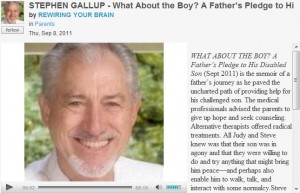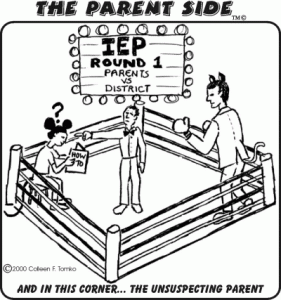Five Facts for Fathers
 Last week, a group of dads belonging to the National Foundation for Autism Research honored me with an invitation to speak at their meeting. The online announcement said I would talk about my book, but I thought it would be more constructive to discuss a few parenting principles. I went in with a short list, and might’ve run out of things to say in just a few minutes. However, the audience was a public speaker’s dream come true. Everybody was so engaged! All that constructive energy renews my hope that the prospect for our kids is improving.
Last week, a group of dads belonging to the National Foundation for Autism Research honored me with an invitation to speak at their meeting. The online announcement said I would talk about my book, but I thought it would be more constructive to discuss a few parenting principles. I went in with a short list, and might’ve run out of things to say in just a few minutes. However, the audience was a public speaker’s dream come true. Everybody was so engaged! All that constructive energy renews my hope that the prospect for our kids is improving.
Anyway, these are the high points of what I said.
A child who is disabled is, first and foremost, still a child.
This may sound like a bromide, but what I’m recommending comes most easily when you are dealing with an apple-cheeked youngster who says cute things and gives you lots of great feedback. A child with problems that make him less than cuddly or responsive may inspire enthusiasm on your part for finding professional help. And that’s great. However, he also desperately needs to be told, repeatedly, in every way, that he is loved and cherished. Kids who give you no eye contact, or who are rigid or combative, need this reassurance at least as much as anyone else. So in addition to being an advocate, be a daddy.
If your doctor doesn’t take your concerns seriously, consider finding another doctor.
As noted previously on this blog, not all doctors are on board with the importance of early intervention, even today. If you find yourself dealing with someone from the nineteenth century, dump him. The next guy you see may be just as bad, but there are good doctors out there—people who know this. We parents owe it to our kids to find them. Remember: Whatever choice is made, we are the ones who live with the consequences.
Have extravagant goals for your kids.
Swing for the fences. If you strike out, at least you know you tried. Imagining a wonderful outcome is not the same as being in denial. Denial is excluding or ignoring information we need to attend to. It’s pretending that everything is fine when things are not fine. Instead of that, I’m talking about doing everything we possibly can to turn the situation around. For me, the question has always been whether I was willing to relax and coast while knowing that there was something I might be doing that could make a difference. And I wasn’t.
Choose your battles.
Initially, I meant to talk only about not letting other people rope you into promoting philosophies and causes that don’t necessarily benefit your child. However, I spent most of my time talking about unwinnable confrontations with school districts. Everyone present had a lot to say on this topic, and this is where I learned the most. Because these days, parents who are prepared and who don’t quit seem to be winning more often! And as for those causes, participation can be energizing. Well, yes, I did know that. Perhaps some of the lessons impressed upon me over the years have been incorrect. If I give this talk again, this point is the one to work on.
Stay balanced
This one almost seems to contradict the point about swinging for the fences. I think it’s consistent if each of us applies common sense. Our families will not be helped if our own lives are ruined in the process of trying to overcome a chronic problem. We must take care of ourselves while we are taking care of our kids. And since I was speaking to a room full of dads when I said this, I referred to a guest blog post from last summer and finished by recommending hugs for wives as well as for kids.




